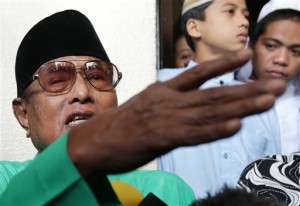KL rejects negotiation to end confrontation with Sulu group
DIGOS CITY, Philippines—Malaysia on Thursday slammed the door on any negotiation to end the crisis in Sabah, saying the Sulu armed men who occupied a village in Lahad Datu in the name of Sultan Jamalul Kiram III last month but have since been dispersed by Malaysian security forces should first lay down their arms and surrender.
In a broadcast monitored here via shortwave radio, the state-run Radio 24 reported Malaysian Foreign Minister Anifah Aman as saying at a news conference that his country will not entertain any negotiations at this time, including one being proposed by third parties such as the Philippine government.
Anifah said Kuala Lumpur will agree to negotiate only if the “Sulu terrorists” will stop shooting at Malaysian forces and lay down their arms.
“They must surrender unconditionally before we can start talking,” he said.
Anifah said there had been some efforts by third parties, including the Philippine government, to open negotiations to find a peaceful end to the month-old crisis that has resulted in the death of 58 Filipinos and 9 Malaysians.
Article continues after this advertisementBut he said “the time is not right for any outsiders to be involved at the moment,” although he admitted going to Brunei last Tuesday to brief Prince Mohamed Bolkiah, the foreign minister, who is the current chair of the Association of Southeast Asian Nations, on the situation in Sabah.
Article continues after this advertisementAnifah said he updated Bolkiah on the Sabah crisis and what Kuala Lumpur has been doing, but he said Malaysia had no intention of discussing it with the rest of the Asean members.
“I don’t think there is any necessity to get other Asean members involved,” he said.
Asked to comment on reports by Philippine media that the Kiram family might be sending emissaries to Sabah to convince Agbimuddin Kiram, Jamalul Kiram’s younger brother, to stop his group’s actions against Malaysian forces, Anifah answered: “What will happen if something were to happen to these peacemakers or negotiators? So this is not the right time for anyone else, apart from security personnel, to be in the area.”
He also rejected a reported plan by the Manila government to send officials to Sabah to check on the condition of Filipinos arrested in the course of Ops Daulat.
“We could not grant them legal access for now because the investigation on suspicions they provided help or security information to the terrorists is continuing,” he said.
In another report, a Sabah-based radio station said the Royal Malaysian Armed Forces announced the deployment of more soldiers, backed by armored personnel carriers and more helicopters, to Tawau, Lahad Datu and Semporna as Ops Daulat continued on Thursday.
Quoting Malaysian military chief Zulkifeli Mohamad Zin, the radio station said the center of the mopping-up operations these days was Sungai Nyamuk in Tawau, where a clash that killed four “Sulu terrorists,” including a woman, and a Malaysian soldier took place on Tuesday.
Zulkifeli was quoted in the report as telling reporters during an early morning news conference that Malaysian forces might be able to take full control of Sungai Nyamuk anytime Thursday.
Last week, Kiram’s followers launched a fresh assault in Lahad Datu, a few hours after Zulkifeli announced that Malaysian forces had regained control over the area and that its residents could return to their homes already. The attack prompted the Malaysian government to suspend the return of villagers displaced by the outbreak of fighting since February 12.
Malaysian police chief Inspector General Ismail Omar was also quoted by Malaysian news agency Bernama as saying more police outposts were to be put up in Tanjung Labian and Felda Sahabat in Lahad Datu; Pulau Bum Bum and Pulau Mabul in Semporna; and in Pulau Gaya, an island near Kota Kinabalu.
Ismail also announced that more policemen were arriving in Sabah from various parts of Malaysia in support of Ops Daulat.
“I have ordered more men to patrol the coastal areas of Lahad Datu and also strategic points here,” Bernama quoted him as saying.
The deployment of more Malaysian security forces to Sabah worried indigenous Sabahans, especially those living near conflict zones, a Sabah-based human rights group said.
Andrew Ambrose of the Sabah Coalition of Human Rights Organizations (Sacohuro) was quoted by another Sabah-based radio station as telling reporters on Thursday that native Sabahans feared for their safety because their areas were now “militarized.”
They also complained about not being able to go about their normal activities because security forces had imposed restrictions, the report quoted Andrew as saying.
The Sun Daily also reported that the arrival of more troops on Sabah made villagers worry they might be mistaken for Sulu gunmen.
In response, Ismail told Bernama that villagers should to stay outside of the areas of conflict and observe restrictions on movements by civilians in some areas to avoid being arrested, or worse, being mistaken for the enemies.
In Sandakan, where policemen continue the crack down on suspected local supporters of the “Sulu terrorists,” “it is safe for the people to go about their daily chores,” Sandakan police chief Rowell Marong said in an interview with a Sandakan-based radio station.
“No curfew has been imposed,” he said.
Speaking over the same radio station, Kota Kinabalu Mayor Abidin Madingkir said his city “is peaceful and the people are going about their activities as usual.”
In Kunak, one of the tree red zones, government-run Radio Televisyen Malaysia reported that “people were going about their activities as usual” despite the heavy deployment of Malaysian security forces against the “Sulu terrorists.”
